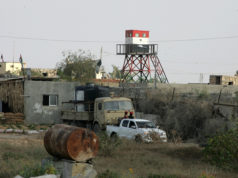Amidst ongoing clashes in response to Egyptian President Mohammed Morsi’s decree granting himself near-absolute power, Egypt’s Constituent Assembly surprised the country and began voting Thursday on a draft constitution. The assembly will vote on each of the draft’s 234 articles and, upon passing the document, will send it to Morsi for approval. Once approved by the president, the constitution will be put to a public referendum.
Today’s vote comes after Morsi gave the assembly an additional two months — until February — to complete its work. But with protests mounting in the streets, Morsi’s supporters in the assembly quickly wrapped up deliberations and prepared for the unscheduled Thursday vote. They seem to hope that rushing through the constitution will help stem the current crisis aimed at the president, as Morsi has said he would relinquish the powers he recently bestowed upon himself once the constitution is ratified in a referendum.

The Shoura Assembly’s main entrance in Cairo, where Egypt’s Constituent Assembly is voting on a draft constitution. (Photo: AFP/GETTY) |
A hearing before the Supreme Constitutional Court challenging the assembly’s legitimacy was scheduled for this Sunday. But with Morsi’s edict last week, the judicial body no longer has the power to dissolve the Constituent Assembly. At the time of voting, only 85 members sat in what was supposed to be a 100-member body, since a quarter of the committee’s members — mostly liberals and leftists as well as representatives of the Coptic Church — had previously walked out due to their belief that Islamists were trying to dominate the process. Only some were replaced, mostly by members of the Muslim Brotherhood and Salafist Al-Nour parties.
As for one of the most hotly-debated topics when writing the constitution — the role of Sharia law in Egypt — according to reports, the assembly has chosen to retain text from the Mubarak-era constitution stating, “The principles of Islamic sharia are the main source of legislation.” But this is unlikely to be the last heard on the subject. The assembly also approved an article stating that Al-Azhar, a seat of Sunni Muslim learning, must be consulted on “matters related to the Islamic sharia”.
Between Morsi’s sweeping new powers and the pushing through of the draft constitution written by an Islamist-dominated body shunned by Egypt’s liberals and leftists, Egypt’s Islamists are undoubtedly doing all they can to lead the country in their desired direction.





